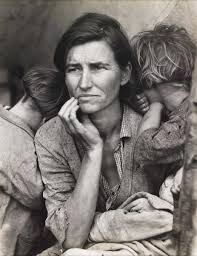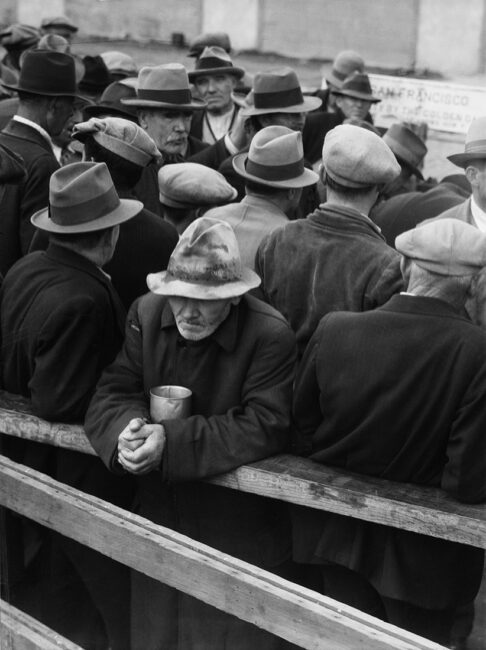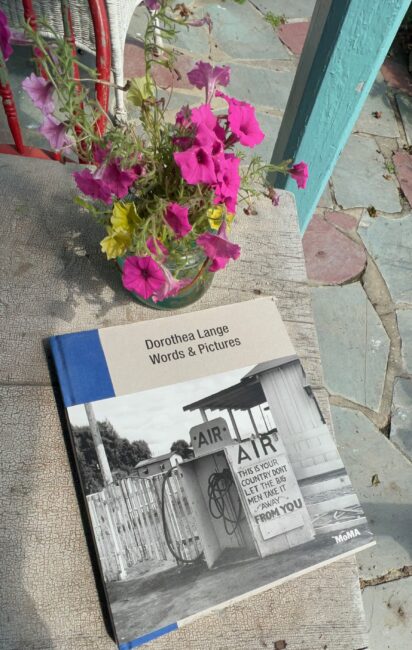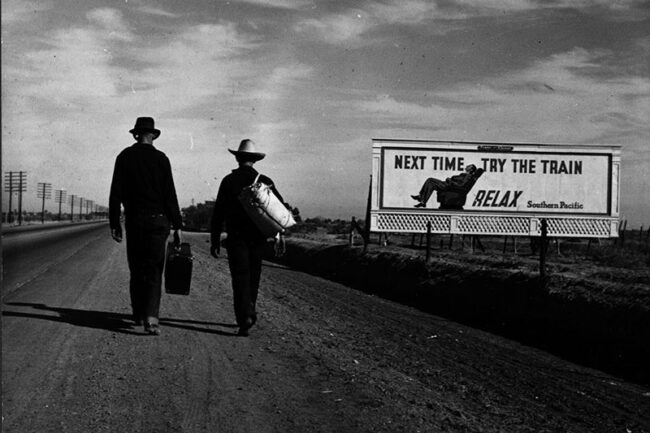“The contemplation of things as they are, without substitution or imposture, without error or confusion, is in itself a nobler thing than a whole harvest of invention…” – Francis Bacon.
The legendary feminist pioneer and brilliant photographer Dorothea Lange hung this quote on the door to her studio in San Francisco after she left her children at home with family and headed out into America for the Farm Security Administration for several years to document the tragedy of the Great Depression.
I bought this book about Dorothea Lange during a visit with Maria to the New York Museum Of Modern Art earlier in our marriage. It changed my life.
Many of you may know her most famous photo, the one above called “Migrant Mother.” When Lange went out into the dust bowl to capture the awful poverty and isolation of the many migrants who lost their homes and farms in the 1920s and 30s, there were only a handful of women professional photographers in the country.
She was courageous, gifted, and determined, three qualities I greatly admire in anyone. Today, people might assault her for being “woke.” Still, her work enchanted me, and she triggered my first stirrings to fulfill a lifelong ambition to be a photographer, something I was never brave enough to do until recently.
Lange had great compassion for the migrants, but her work was never meant to be political or divisive, just truth. She captured one famous sign she saw at a food pantry run by a Church: “This Is Our Country: Don’t Let The Big Men Take It Away.” It seems pretty timely to me.
Her notion of photography touched me as being simple. I learned quickly that hitting the shutter is the least of it. You have to have a philosophy, a goal. Mine is to capture the soul and beauty of nature’s calling card, the simple flower.
I also have a philosophy of portraiture – the photos must be close and straightforward, and I love, like, or respect the subject, or I won’t take the picture.
(I couldn’t count how many times I’ve read this book. I’m going to read it again tonight.”)
Lange captured the heartbreak, suffering, and loneliness of migrant life beautifully and very simply. There is only the drama of life in her work. She inspires me in many ways, much more than any other photographer whose work I’ve studied. I’m older than she is, and I don’t have the freedom to roam the country and capture the struggle of the refugees and immigrants – almost as acute now as when she saw and photographed it.
But she influences my work much more than Edward Hopper and Georgia O’Keeffe, both of whom I admire.
“All photographs,” Lange wrote, “not only those that are so-called documentary,” and everything is documentary and belongs in some place, has a place in history – can be fortified by words.”
This is a big idea, one I try to practice myself. When I started taking photos seriously about 12 years ago, I thought of them as something that would fortify and support my words. The more I can show rather than tell, the more credible my words are. You don’t need to take my words for things; you can see it.
As you know, I don’t argue my beliefs on the Internet. My words and photographs speak for me. My words and pictures support one another; neither would be strong without the other.
In my mind, they are all meant to be simply the hallmark of good photography.
During the Depression, tens of thousands of farmers lost their farms to dust and foreclosure. They and their families traveled the heartland looking for any work they could find to feed their families. Being America, they were taken awful advantage of and suffered untold hunger and struggle. Lange’s photographs enormously impacted America and helped lead to Franklin Roosevelt’s New Deal.
In our time, we increasingly blame people for being poor. Her photos gave the lie to the idea that they were just lazy vagabonds feeding off the rest of us. They captured their sadness, fear, and great suffering.
I can’t help but think of the impoverished and terrorized immigrants who walk across South America and risk their lives to get to the U.S. Border and into America. Much of the country has little sympathy for them, as they had little for the migrants of the 193o’s.
In Lange’s time, people were horrified by the pictures she took. Their simplicity, the great she had for the emotion in their faces, moved people.
I recommend one Dorthea Lange book; there are a number of them. It’s called Dorothea, The Photographer Who Found The Faces Of The Depression, by Carol Boston.
I learned so much from reading about her and studying her photographs. Her bravery and empathy are profound and touch the soul.





Dorothea Lange was a visionary in so many ways. I have been familiar with her forever…….since one her most well known photos *Migrant Mother* was taken only 35 miles south of where I live……….. her vision, her eye (photographically) and her empathy…….. made her IMO one of the greatest photographers of her time. Your photography also has empathy and vision……. and I believe I can almost always *feel* what you are trying to capture
Susan M
Dorothea, not Dorothy. Please show respect for your subjects by getting their names right!
Paul I thank you for the correction. Sorry you sound like such an ass. It fascinates me how correcting people brings out the worst in the correctors on social media.. We all make mistakes, me more than most and social media has taught me to not correct other people, or if I do to try not to shame them which is nothing a power superiority thing. To me, that’s much worse than a mistake which can be corrected. I suspect Paul will be an asshole for the rest of his life.
Hear Hear!!!
Her name is still spelled wrong throughout the piece—you only fixed it in the title. God is in the details!
shame on you, Paul! Jon spelled it correctly ………and you are being petty…..sorry. But you are.
Susan M
I did misspell it Susan but Paul is creepy, thanks for your kindness.I grew up around people like Paul and Eileen who took pleasure in making me feel stupid. I don’t feel that any ore, I mostly feel gratitude that I am not them. I don’t correct other people’s mistakes, I worry about mine.
Jon, Since you dislike me anyway, I might as well say what I think. There is a big difference in the migrations in the depression( my dad grew up in that era) and the illegals coming in now. I don’t mean the legal immigrants in your school, but illegals. There are laws for entering this country which are being ignored. How can that be justified?